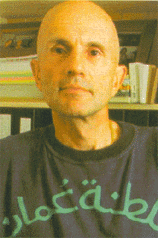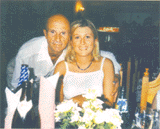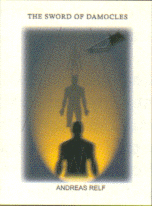Originally published in January 2003 icon
Retro-perineal myxoid-liposarcoma

The Sword of Damocles ~ An inspiring account of a survivor of a rare cancer ~ by Andreas Reef
JANUARY 2003
BOOK REVIEW
Andreas Reef is the only person in the UK with retro-perineal myxoid-liposarcoma (cancer of the fatty tissues behind the pelvis and hip) - the rarest and most aggressive type of cancer known. Nine years ago he was told there was no hope, no cure and given six months to live.
His book, The Sword of Damocles, details his fight against that prognosis, his years of surgery and other treatment. It’s an inspiring story of one man’s struggle to regain fitness and beat cancer, and clearly shows the power of the mind and the support he’s received from family and "an outstanding" group of friends.
He even found love, when he was badly ill, and has been married to Dana for four years. Today Andreas lives with the problems caused by the side effects of treatment, but wakes each day with a smile and continues to plan years rather than days ahead.
"I am a very lucky person to have so many people close to me. People who care about me and love me for what I am and not for what I have. I have a wonderful wife, who puts up with so much and never complains; I’ve just moved house, in Salisbury, but most of all I’m pretty lucky to be alive nine years after diagnosis.
I don’t normally reflect on things like this, but a few months ago my friends helped me throw a party for my 45th birthday and I was quite overwhelmed at the fantastic support I’ve got. More than 115 people made their way to a friend’s hotel in Hull, from all around the UK, Germany, Italy and Canada. There was music and dancing all night, a moving speech from Mark, one of my best friends, and loads of gifts, which I wasn’t expecting, because the biggest gift of all was that people came.
Five years ago I decided to write a book to thank those who never gave up on me, no matter how bad it became, and to help others diagnosed with cancer. Before you start thinking, ’Oh, here we go again, some hard luck story about a cancer patient,’ just hear me out. I am not a great movie star or sportsman. I’m just an exsquaddie who studied to become an anaesthetic technician and was leading a perfectly normal life when I was struck down. There I was at 37, playing a lot of sport, working an eight-hour day at the Queen Elizabeth Military Hospital in Woolwich, having the odd drink, but never getting drunk, smoking, but not too many. I was pretty normal. Then I started getting a shooting pain - like an electric shock - through my groin region.
As I worked in a hospital, I asked one of the general surgery doctors about it. His answer was logical and my feelings of anxiety were alleviated. As I was playing a lot of football (I coached a team) I had probably strained a muscle in my groin and should take a two-week break from sport.
Then the pain persisted, the surgeon suggested I see my GP and ask for a consultation with the head of surgery at our hospital. My GP told me I had a hernia and then argued that the hospital I wanted to be treated at didn’t exist, until I told her that I worked there and that Dr Roger Brookstein would be the consultant.
She then started to treat me like a real person. Had I been a non-medical person, I suspect I would have been fobbed off.
A month later Roger could find no evidence of a hernia, which left us both confused, and we decided that I should carry on as normal and let him know if I had any more unusual symptoms, as I saw him at work anyway. Over the next few weeks I started getting even more discomfort, and the feeling that I had to go to the bathroom all the time. I felt as though my bladder had been displaced and moved to the right side of my body. Then one day, at a soccer match, I discovered a mass in my pelvic region and could actually manipulate it. Roger agreed that my whole abdomen had changed shape quite dramatically in the three weeks since he’d examined me, and that I should have an ultrasound scan. This revealed a large mass in the inguinal (groin) region, and a CAT scan showed it was pushing into my bladder. We thought it resembled Iymphoma, at first, which, if you are to have cancer, is the one to get.
It was now over two months since I had first noticed something abnormal, and the next stage Roger informed me was a mini-Iaparotomy (an incision of the abdominal wall, in this case to partially debaulk a malignant tumour so that it could be tested at the main laboratory in Millbank). I was relieved something was happening at last, and packed for what I thought would be a two-week stay.
After the operation, Roger came to explain that he had found a slightly larger mass than expected, and had removed about a kilo and a half of it to send to the lab. He had never come across anything like it. Friends and colleagues came to visit me over the next week, and I was up and about walking to get my muscles working.
Just as I was beginning to feel better, Roger came to tell me that the cancer was myxoid-Iiposarcoma. There was worse news. He had not managed to get it all out, and would have to operate again.
The rest of the tumour was wrapped around the major blood vessels and nerves that go to my left leg and groin. It was to be difficult surgery and would happen the next morning.
I knew there was something wrong when I woke up in the intensive care unit surrounded by the anaesthetic team. In trying to free the remains of the tumour, my sacro-iliac artery had been nicked. I had bled four and a half litres which, as the average human body only has four litres in it, is a lot! I had had a total transfusion. Roger told me he had removed as much of the tumour as he could find, and I was more than happy with that. Now I had to get back to normal as soon as I could.
I had the will-power to work, and was determined to get out of hospital in a few months, in time for Christmas 1994. It was asking a lot from my battered body, but I knew I could do it as I had been extremely fit. All my life had revolved around staying in shape, and playing soccer, but my first day at the hospital gym was a complete disaster. The walk to the gym that would normally take about three minutes took 20! One of the army remedial gymnasts started me on the exercise bike, to get warmed up, but it took all my strength to get the wheels to turn on the lowest gauge. My left leg wouldn’t do what my brain was telling it to, and after a couple of minutes I had to stop out of exhaustion. The next day I ached as if I had been run over by a herd of buffaloes, but I had to try again.
Soon I was getting along fine and slowly my muscle bulk started to reappear. Only a few weeks before I had seen myself in the mirror after a shower and had wanted to cry. I was nothing more than a bag of bones. Now, after a month of eating and working out, I was beginning to resemble my old self again.
I was determined to spend Christmas with my parents, sister and niece, and one day, towards the end of December, I found myself outside the hospital waiting for my lift home! It was a strange but good feeling.
Two months after leaving hospital I played my first soccer game and the next week scored the first two goals for our team. This was especially satisfying as I don’t normally do that! I also had a new job in medical sales, which I thoroughly enjoyed, and the year went by quickly. I’d had a final check-up with Roger before he left the army and the Woolwich hospital was sold off, a very sad time, and I was put in the capable hands of a Mr Meirion Thomas who was to be my surgeon and sarcoma consultant, although I didn’t meet him for a while. Towards the end of December, I started noticing pains in my buttock again and I made an appointment for January 1996.
I was very apprehensive about my first visit to the Royal Marsden. Roger had already told me that this type of cancer would reoccur and in my heart I knew it had. Meirion Thomas is a great man and I owe him my life. He and I were to have a very long doctor/patient relationship. He was in no doubt that the tumour was back as he could feel it whilst doing the rectal examination.
Before my third operation, Mr Thomas decided to put me on a course of chemotherapy to shrink the tumour. The key to chemotherapy is to take the tablets, to stop you feeling nauseous, when you are told to. There are some pretty nasty side effects if you do not do as you are told. Most foods eventually lose their taste but you must keep your strength up and the only way to do that is to keep to a healthy balanced diet. When my hair started to fall out I went straight to the hairdresser and asked him to remove the lot. So many people said it suited me that I’ve kept it shaved to the scalp.
After two courses of chemotherapy with different drugs, a scan showed that the tumour had shrunk significantly and I was booked in for the laparotomy at the end of August.
The surgery was very difficult, as there were lots of adhesions from the previous two operations.
Most of the tumour was removed, but there was a certain amount which could not be reached so I was to start an extended course of radiotherapy only one week after the operation. Having got this far, I was under the impression that radiotherapy would be a breeze.
Little did I know that I was to get radiation poisoning after two weeks of treatment. It started with the worst stomach ache you could imagine, loss of appetite and vomiting five times a day. They carried on with the treatment, but after a few days my weight plummeted and I was so weak they had to stop. I was in a wheelchair and had reached an all-time low, but I tried to keep my spirits up and all my friends in England called or visited every day, and the ones in Saudi Arabia called every week.
I might have been stuck on that ward a lot longer if it wasn’t for my friend Michael. He, and three others, came to see me and suggested we go out for a coffee. I refused the wheelchair and two of them supported me as we walked across the road. We were having such a good time we then went on to watch a game of football, in a pub, and on for a meal down the King’s Road. The next day I was so tired I couldn’t get out of bed until late, but that was the turning point for me. Michael had given me a new lease of life. I decided to put maximum effort into getting myself back together and never used a wheelchair again. I was out in time for Christmas, again, and had made it through the worst four months of my life.
The following year, 1997, had great highs - wonderful trips to Tenerife, Oman, and Egypt where I met Dana, a wonderful, intelligent and beautiful lady, who became my wife in 1998 - and lows of more surgery.
Only a month or so after the radiotherapy I started getting excruciating stomach pains. I had an appointment at the Marsden in March and everything went well at my check-up but when I mentioned the bellyache Mr Thomas ordered a barium meal. It showed a three-foot blockage in my intestines, probably caused by the radiotherapy. I had to have a bowel bypass then, and again in the summer of 1999, which eventually resulted in the colostomy I still have.
The tumour came back in 2001 and, as I’d exhausted all the treatment in England, I was given a trial chemotherapy drug from America which I took for 10 months to stop the tumour growing. So here I am today with a pelvis and hip full of tumour and a left leg that doesn’t work properly, because the pressure is pushing on my sciatic nerve, but I ignore it all.
My mental attitude is great, my physical body is not that good but I still look to the future and get on with my life.
I’ve designed some medical equipment I’m trying to market around the UK and I’m going to start hydrotherapy this year (2003), for the feelgood factor and to build myself up.
Once you give in you’ve had it. The majority of people with cancer think that’s it, and go into themselves, but my attitude is to carry on as normal. I have mentioned that the most important things that have kept me going are the power of the mind and friendship. I forgot to mention the other one.
LOVE. I never had that special person in my life before. Someone who would love me for who I am, and with the same passion that I had for them. I always wanted to share my life with someone special - and now, thanks to my wonderful wife and best friend Dana, I do."

Andreas and Dana Relf

SPECIAL OFFER FOR I C O N READERS
THE SWORD OF DAMOCLES
By Andreas Relf is published by Cromwell Publishers (rrp 6.99)
Order your copy for the special price of 5.99 by calling 01484 545123 (ask for sales and mention Icon) or by email to: orders@cromwellpublishers.co.uk
Retro-perineal myxoid-liposarcoma
This condition is so rare that Andreas seems to be the only person living with it in the UK.
A sarcoma is a tumour of the connective tissue. Soft tissue sarcomas are the rarest. Myxoid Iipo-sarcoma is so rare that there is barely any information on it. Retro-perineal is the position of the cancer, ie: cancer of the fatty tissues behind the pelvis and hip.
Mr Meirion Thomas, consultant surgeon at the Royal Marsden’s Melanoma and Sarcoma unit has been so impressed by the way Andreas has handled his condition that he has written this foreword to his book:
"This is a remarkable story about one mans long baffle to overcome cancer. Andreas demonstrates courage and determination, and the book provides an unique insight into his strength of character, energy and ability to adapt the face of extreme emotional and physical difficulty. Supported by friends and family and armed with huge tenacity Andreas demonstrates his intention to succeed and to live life to the full."